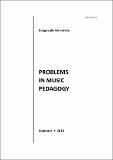DYNAMICS IN CANDIDATES’PREFERENCE CHOICES AT THE KENYA CERTIFICATE OF SECONDARY EDUCATION (KCSE) MUSIC PRACTICAL EXAMINATION

View/
Publication Date
2010Author
African music scholars are currently grappling with the challenges of refocusing musical arts based on indigenous knowledge for classroom practice as well as developing Africa-sensed musical arts curricula that use culturally appropriate pedagogies derived from viable theoretical, philosophical and performance practices of indigenous music. The African spirit of humanity encourages all-inclusive participation that bonds participants in performance-based learning situations. The philosophy framing an assessment model should derive from the ideology of humanity (grounded in humane qualities and aspirations) embedded in musical arts education indigenous to the area of a culture. This model should enable and acknowledge demonstration of differentiated innate attributes and take into account the compatible skills of every participant in the learning activity. Rigid assessment yardsticks are often transferred from Western elitist music education practice and used in the assessment of the musical arts in Africa, thus compromising innate musicality. In this article we advocate for assessment initiatives that should enhance the humanity virtues of indigenous intellectual and praxial paradigms, as well as taking note of epistemological logic embedded in contemporary realities. Two different examples from two African countries are used to illustrate our argument
Metadata
Show full item recordAbstract/
Most studies have used the element of listening response to musical stimuli to determine
music preferences of the various groups studied. In this study however, the term
preference is used to mean the art of choosing one type of music (vocal or instrumental)
over another without necessarily using a musical stimulus as the benchmark. This study
investigated candidates’ perceived reasons for choosing to perform certain items in the
African and Western sections of music practical performance to determine the factors
influencing their preference choices in Kenya Certificate of Secondary Education (KCSE)
examination. Questionnaires were administered to 33 music candidates from three girls
and three boy’s schools from 6 districts in Nyanza province in Kenya who sat for their
KCSE music practical examinations in 2009. Oral interview was used to collect data from
11 teachers. Content analysis of the secondary school music syllabus, Kenya National
Examinations Council (KNEC) Syllabus 20062007
and the Kenya National Examinations
Council 20052007
KCSE Examination Report was done to establish the syllabus
requirement and categories of choices outlined for candidates in paper 511/1. Musical
analysis of 8 vocal pieces was done to explore the intrinsic characteristics of the pieces.
The results showed that students do not make their own choices, instead, teachers use
forced choice approach to select pieces for students based on the teachers’ specialization,
inclination and competency.
Collections
Related items
Showing items related by title, author, creator and subject.
-
Analysis of assimilated elements of contemporary music into traditional worship music in Africa inland church, Mukaa district church council, Makueni, Kenya
KIAMBA, Joseph Ngui (Maseno University, 2019)Worship music is a genre which is lyrically focused on matters concerned with christian faith. Assimilated elements of contemporary music into AIC traditional worship music (TWM) expressions are becoming more popular with ... -
Sequencing of Music Syllabus Content and Its Implications On Continuity and Progression in Learning at Secondary School, Kakamega County, Kenya
MUTUKU, James Masila (Maseno University, 2016)ABSTRACT It is axiomatic that a young person‘s experience of education should be coherent, continuous and progressive. This can be achieved when the syllabus content layering provides continuity and progression in ... -
The cultural marriage music of the Abaluhya: Song text as a mode of discourse
Kaskon W Mindoti (Centering on African practice in musical arts education. Edited by M. Mans. Cape Town: African Minds, 2006)In this chapter, I discuss how the indigenous marriage music of the Abaluhya takes a special role in relaying messages to the bridal couple. Through song, performers acquire special licence to use some text, which in ...
